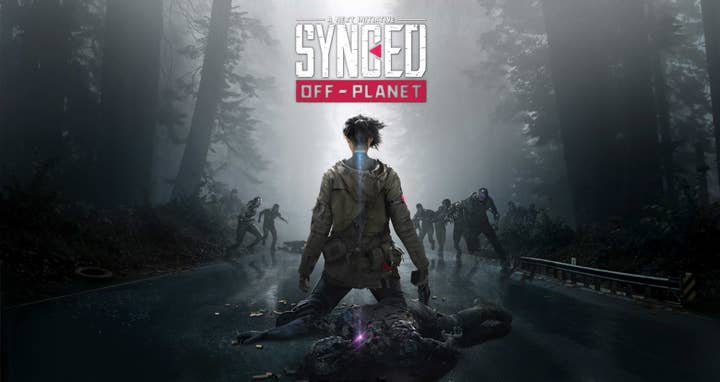The Tencent zombie game trying to advance the battle royale formula
We speak to Next Studios about how Synced: Off-Planet recreates the tension of Fortnite or DayZ without copying the structure
It may feel like the gold rush of new battle royales is dying down, but there are still companies rolling out their own alternatives to Fornite, PUBG et al.
When it's an indie studio or smaller developer, it's perhaps easy to dismiss as just another hopeful -- but when it's the biggest games company in the world, it's hard not to take notice.
Tencent, through its internal developer Next Studios, is entering the fray with Synced: Off-Planet, a sci-fi action survival game that pits sixteen teams of three players against each other. But, as an added complication, there are also hordes of zombies to contend with.
The game is set in a near future where advances in nanotechnology have seen humankind augment themselves with new abilities, but when that tech corrupts it transforms a person into a mindless beast (that would be the zombies). The survivors' solution is to gun down their former fellow man and commandeer shuttles that can take them off planet.

For producer and director Clark Jiayang Yang, the scenario lends itself to a unique PvPvE formula that he hopes will help Synced stand out from other popular titles.
"It feels like a battle royale, but a lot of things are different," he tells GamesIndustry.biz. "We don't jump out of the ship, we don't have the shrinking circles, and you don't need to be the last one standing, because the goal is to capture the shuttle and leave."
Yang pushes the absence of a slowly diminishing playspace is a key differentiator -- and in fact a flaw in the established battle royale formula, arguing that many games "lack a story reason" for why dozens of players are trapped in a shrinking circle.
"It's very rule based and that's it," he says. "But in [Synced], it's very objective driven because you want to capture the shuttle so naturally people come together."
Next Studios is also keen to highlight other differences outside the matches themselves. Players will have a home base to maintain, which can be improved with resources gathered in each session. And at the centre is still this race to be the last team standing, or rather the first team to escape the zombie hordes, leaving the others to their fate. Does this design make the Synced: Off-Planet a conscious effort to move away from battle royale?
"It's the next step," Yang says. "The battle royale formula is very stable. Games like Fortnite have the same rules for the game, but we wanted to see if there are any other ways to have this tension and have this journey."
"It feels like a battle royale, but a lot of things are different. We don't jump out of the ship, we don't have the shrinking circles, and you don't need to be the last one standing"
Technically, the zombies are called Nanos and are more like synthetic drones than lumbering corpses, but Yang is in no way determined to make this distinction -- this is still a zombie survival game, he says. That invites more comparison with H1Z1 or DayZ than Fortnite, but again the producer is confident there's enough here to differentiate his project from the titles that have come before.
By far the most obvious example is the ability to 'sync' with the nanotech-driven hordes. This not only gives you their intel on the battlefield, highlighting player positions, but enables you to actually command the zombies and set them against your enemies. The dynamic of a match can change in an instant; one minute the zombies are your greatest threat, the next they're your own personal army. It's a feature Yang believes "really puts the tactics" into zombie survival.
"All the zombie games are basically the same: You shoot, you run, you find more ammo, you shoot again," he says. "You do that all the time, and that's how it works. But in this game, you can synchronize with the horde, half the horde will become yours and you don't even need to fire a gun... So this is a twist, to make people think about the zombies in a different way."
One last selling point for Synced is the visuals. The game has been developed in partnership with Nvidia and designed as a showcase for ray tracing, the advanced lighting technique that allows for realistic reflections and more. While it's not essential to the gameplay, Next Studios believes it is a way of future-proofing the game.
"We wanted to make sure it's in the game, because if you're looking two or three years from now, every game will have that feature," Yang explains. "That will be the new standard. Ray tracing is not only for reflection or shadow, it can be a lot of features, like the global illumination, for example. We will be making sure that the fidelity of the game looks realistic [because] later on if you don't do that, people will say, 'Man, this doesn't look good enough.' We want to get the experience of how it works, and later on the future that will benefit us very well."
Nvidia isn't the only partner working with Next Studios on this project. The game is being co-developed by UK indie Studio Gobo -- something Yang is thankful for given the current limits of his own studio.
"Ray tracing will be the new standard. Later on if you don't do that, people will say, 'Man, this doesn't look good enough'"
"At Next, we don't have a big team," he says. "We only have a team of 50. As you can see, the vast scope and producing something of higher quality requires a lot of work. And at the same time we're a young team. We're learning, we're growing. We made a lot of mistakes but at the same time we're becoming more and more mature.
"Realising that it would be good to have some extra help with the game, we knew Gobo had worked with Ubisoft and Disney, and they are really experienced. So if work with them, we can produce more content, and at the same time use their experience to help us, and their expertise and international talent pool. For us, it's a plus to be working together. It's prosperous for everyone."
As a small team, albeit backed by the largest games company in the world, this does increase the pressure to run Synced: Off-Planet beyond launch. Players have come to expect their online multiplayer games to evolve over time, thanks in no small part to the likes of Fortnite and PUBG. Even the mighty Epic Games resorted to crunch to meet the demands of its ravenous audience, so how can Next Studios hope to avoid this?
"To be honest, we can't avoid crunching," Yang admits. "That is just the industry today. [But] our team can grow, and the Gobo team can grow too."
Synced: Off-Planet is currently in development for PC, but it wouldn't be a surprise to see it emerge on PlayStation 5 or Microsoft's Project Scarlett. There is no release date confirmed, nor is Next Studios able to confirm the business model, emphasising the project is at an early stage.
But the determined move away from shrinking circles and the same run-and-gun zombie-killing gameplay -- plus, lest we forget, the weight of Tencent behind it -- should put the game in good stead to attract a sizeable audience when it eventually arrives.


